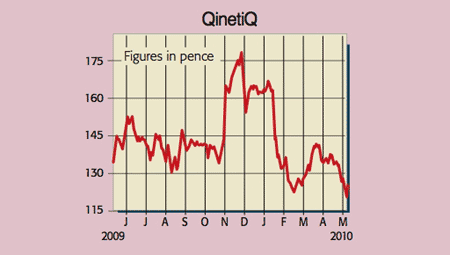
It’s been a challenging six months for Qinetiq, the UK business that was originally born out of the Ministry of Defence’s (MoD) research laboratories. Indeed, despite being jam packed with proprietary technology that would even make ‘Q’ from the James Bond films green with envy, it has been hit by a double whammy of delayed MoD spending ahead of the general election and a reduction in military orders from America for deployment within Afghanistan. Nonetheless, after two profit-warnings in as many months and the appointment of a new hard-nosed CEO, I believe this stock looks undervalued.
Unlike many of its peers, Qinetiq isn’t simply a straight manufacturer of hardware, but is more of a service company with a £1.1bn order book. This gives it good earnings visibility. It also enjoys a Long-Term Partnering Agreement with the MoD (worth an estimated £4.4bn over the next 19 years), under which it provides outsourced testing and evaluation services.
Qinetiq’s Metrix consortium (operating under a £12.5bn, 25-year public-finance initiative deal) has been named as the preferred bidder to construct a training academy for the UK armed forces in South Wales. This new, 1,000-acre college will accommodate up to 3,000 students. Locked away in its research vaults, Qinetiq also owns an armoury of clever science (3,100 registered or pending patents) that has been tried and tested in hostile environments. Consequently, the board has set up a Ventures team (which is currently loss-making) with the aim of commercialising this huge portfolio of deep knowledge in other fields, such as digital communications, cyber-crime and nano-technology. An example of an area that immediately lends itself to civilian life is the firm’s expertise in robotics and unmanned aircraft. Not only can it provide battlefield robots and body-armour, it has also begun selling spin-off products, such as Tarsier (an airport runway hazard-detection system) and Borderwatch, used for immigration control. Geographically, the firm is also well balanced. It should benefit from a strengthening dollar, as around 45% of revenues are derived from America.
The City is forecasting revenues and underlying earnings per share of £1.6bn and 11.2p respectively for the year ending March 2010, rising to £1.7bn and 12.2p next. This puts the shares on average p/e ratios of 10.7 and 10.0. However, I would value the stock on a through-cycle Ebitda of ten. After adjusting for the £509m in net debt and £157m pension deficit, that produces an intrinsic value of about 150p per share.
So what about downsides? With 34% of revenues tied to the MoD, the group could get hit by further budget cuts – in a worst-case scenario that could mean the dividend is trimmed to conserve cash. That said, I don’t believe Qinetiq’s life-protecting products will be too badly affected.
In summary, with a new CEO at the helm who has earned his stripes turning-around De La Rue, along with a treasure-trove of top-notch science, Qinetiq rates as a speculative buy. It could even end up as a takeover target for an American rival. Preliminary results are due out on 27 May.
Recommendation: BUY at 120p
• Paul Hill also writes a weekly share-tipping newsletter, Precision Guided Investments